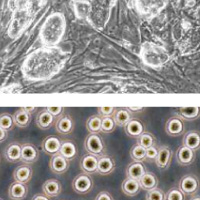
HOME > Project > Stem Cell Project
Development of Stem Cell-based Blood Regeneration Techniques for Cancer Therapy

Leader
Takahiko Hara
Stem Cell Project
- Backgrounds and Objectives
- Brief summary of research
- Recent research topics
- Members
- Selected Publications
Brochure 2018_PDF ![]() (399.9KB)
(399.9KB)
Brief summary of research
Blood regeneration from ESC/iPSC and development of novel anti-cancer drugs
Dr. Yamanaka’s inducible pluripotent stem cell (iPSC) technology has opened a new avenue to overcome incurable diseases by transplantation of missing cells. In 2011, we discovered that overexpression of Lhx2 in hemogenic mesodermal cells resulted in ex vivo expansion of transplantable hematopoietic stem cells (HSCs) from mouse embryonic stem cells (ESCs) and iPSCs. Since then, we are making great efforts to improve the system and apply this method to human iPSCs. We believe that comparison of the in vitro differentiation capacity of hematopoietic cells between mouse and human iPSCs would uncover novel and fundamental aspects of human HSC development.
“We are making efforts to derive HSCs from human iPSCs in vitro. We are also challenging to develop novel anti-leukemia drugs and chemokine-based anti-cancer drugs.”
The presence of cancer stem cells has been proposed in various types of human cancer. As with tissue stem cells, cancer stem cells reside in a niche and stay dormant, thereby surviving chemotherapy and radio-therapy. Presumably, both tissue and cancer stem cells commonly express critical transcriptional regulators and signal transducers. We have already identified DDX1 and PTPN23 as essential molecules for the onset of testicular tumors.

In 2007, we discovered that CXCL14, a CXC-type chemokine, is one of the causative factors for obesity-associated diabetes. In contrast, CXCL14 is known to possess tumor-suppressive activity against lung and oral carcinomas. Recently, we discovered that CXCL14 binds to CXCR4 with high affinity, thereby inhibiting the CXCL12-mediated cell migration. This could be one of the underlying mechanisms of the CXCL14’s anti-tumor function. We are vigorously investigating physiological roles of CXCL14 and its action mechanisms. CXCL14 is a promising tool for developing novel anti-cancer and anti-diabetes drugs.
